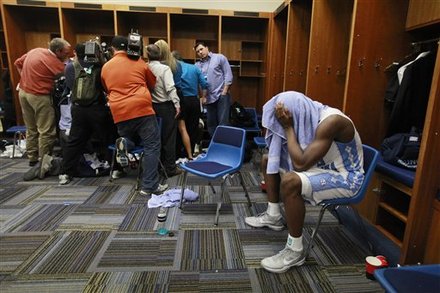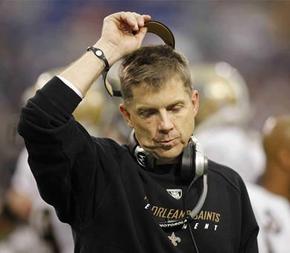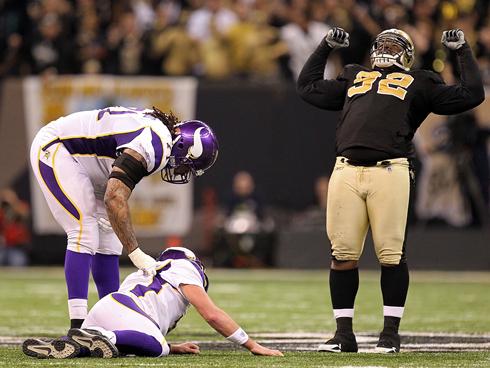2 years. 1228 points. 414 rebounds. Over 60 wins. 2 Elite 8 appearances and ACC Regular Season Championships. A 1st Team All-Conference Selection and an 2nd Team All-American one to boot. An ACC Freshman of the Year Award. No less than 7 game winning or go head shots in the final two-minutes of games. 2x Pre-Season All-American selection.
That's quite the line for a college sophomore, a 20-year-old kid who plays for one of college basketball's most storied and successful programs. Some would call it impressive even. In fact an untrained eye might look at these numbers and be more than willing to compare them to the early collegiate accomplishments of the greatest player to ever take a court. Might look at them favorably even.
But none of us will, and that's understandable. After all not even Harrison Barnes' most ardent supporters would argue that he is even in the same stratosphere as Michael Jeffrey Jordan, and not just because his field goal percentage is 10 points lower than his Airness' was, or his defensive awareness and playmaking ability don't jump off the charts like MJ's did.
No that's not it at all. You see, there's something about Harrison Barnes that we don't get. While the Jordan we all remember was forged by a competitive fire, an outwardly expressed desire and will to win that exceeded anything we had ever seen before, the cerebral Barnes just doesn't come across that way. Even when he was burying game winning shots as a freshman, we saw more LeBron James in him than Michael.
That's because, like with Mr. James, we've always been curious as to why Barnes isn't as good as we think he can be. We criticize him for being too much of a jump shooter, instead of crediting him for being able to nail jump shots. We watch flashes of dominant athleticism and decry why we don't see them more often, instead of salivating at what just happened. We judge Harrison Barnes against what we think he should or could be, instead of what he is.
And that too is understandable. As LeBron James or Tim Tebow can tell you, in our culture when the hype machine is pumping--and you are even slightly contributing to it--expectations can, and will, quickly get out of your control. When you announce your college choice via Skype or openly mention your desire to create and establish your own brand, we don't see an 18-year-old kid having fun or a 20-year-old kid on a quest to be an entrepreneur. We see someone feeding the hoopla, and quickly step in to over run it.
And in the end maybe that's fair. After all Harrison Barnes has twice been selected as a pre-season All-American (including the being the first freshman to ever be selected to the squad), but has never been close to being selected as a postseason one. He entered the national scene as a freshman who was suppose to be the second-coming of Jordan, or at least Carmelo Anthony or Kevin Durant. And we would all agree that he certainly hasn't been. His game has spoken on the court, but it hasn't always been as loud or as clear as we hoped it would be.
So, is that the difference between our perception of Barnes and our current view of Jordan's time at UNC? While Barnes was arguably the most heralded recruit ever, Jordan was far from a big name. While the Tar Heels put the ball in Barnes hands and said "go win the game" from his first day on campus, Jordan was given time to develop and learn behind All-Americans like James Worthy and Sam Perkins. While Barnes was going 8 for 30 in the final two games of the season this weekend--ultimately unable to will his team to victory without his point guard--Jordan was already sporting a NCAA title ring after draining the first "biggest shot for his life" in the 1982 championship game. While Jordan started coming through before we expected him to, Barnes often didn't when we most thought that he would.
So, what does all of this mean for Barnes' legacy in Chapel Hill? He'll probably be gone soon, off to the NBA and a fat contract as a top 5 draft pick (Think that's too high? Wait till your team is the one that passes on him). His jersey will hang from the rafters in the Smith Center forever (an honor he earned as a 2nd Team All-American selection of the National Association of Basketball Coaches). He will always sport two conference title rings, and may have been a fluke injury to his team's floor general away from a Final Four and a National Title of his own.
Yet the consensus is that Barnes' time in powder blue has ended unfilled. No one thinks that is he is now, or ever will be, included in the same sentence as Michael Jordan. And he probably won't be. But, does that already make him a bust?
Remember, Jordan wasn't in that sentence either in 1983. He was just a college sophomore.
A college sophomore a lot like Harrison Barnes.
That's quite the line for a college sophomore, a 20-year-old kid who plays for one of college basketball's most storied and successful programs. Some would call it impressive even. In fact an untrained eye might look at these numbers and be more than willing to compare them to the early collegiate accomplishments of the greatest player to ever take a court. Might look at them favorably even.
But none of us will, and that's understandable. After all not even Harrison Barnes' most ardent supporters would argue that he is even in the same stratosphere as Michael Jeffrey Jordan, and not just because his field goal percentage is 10 points lower than his Airness' was, or his defensive awareness and playmaking ability don't jump off the charts like MJ's did.
No that's not it at all. You see, there's something about Harrison Barnes that we don't get. While the Jordan we all remember was forged by a competitive fire, an outwardly expressed desire and will to win that exceeded anything we had ever seen before, the cerebral Barnes just doesn't come across that way. Even when he was burying game winning shots as a freshman, we saw more LeBron James in him than Michael.
That's because, like with Mr. James, we've always been curious as to why Barnes isn't as good as we think he can be. We criticize him for being too much of a jump shooter, instead of crediting him for being able to nail jump shots. We watch flashes of dominant athleticism and decry why we don't see them more often, instead of salivating at what just happened. We judge Harrison Barnes against what we think he should or could be, instead of what he is.
And that too is understandable. As LeBron James or Tim Tebow can tell you, in our culture when the hype machine is pumping--and you are even slightly contributing to it--expectations can, and will, quickly get out of your control. When you announce your college choice via Skype or openly mention your desire to create and establish your own brand, we don't see an 18-year-old kid having fun or a 20-year-old kid on a quest to be an entrepreneur. We see someone feeding the hoopla, and quickly step in to over run it.
And in the end maybe that's fair. After all Harrison Barnes has twice been selected as a pre-season All-American (including the being the first freshman to ever be selected to the squad), but has never been close to being selected as a postseason one. He entered the national scene as a freshman who was suppose to be the second-coming of Jordan, or at least Carmelo Anthony or Kevin Durant. And we would all agree that he certainly hasn't been. His game has spoken on the court, but it hasn't always been as loud or as clear as we hoped it would be.
So, is that the difference between our perception of Barnes and our current view of Jordan's time at UNC? While Barnes was arguably the most heralded recruit ever, Jordan was far from a big name. While the Tar Heels put the ball in Barnes hands and said "go win the game" from his first day on campus, Jordan was given time to develop and learn behind All-Americans like James Worthy and Sam Perkins. While Barnes was going 8 for 30 in the final two games of the season this weekend--ultimately unable to will his team to victory without his point guard--Jordan was already sporting a NCAA title ring after draining the first "biggest shot for his life" in the 1982 championship game. While Jordan started coming through before we expected him to, Barnes often didn't when we most thought that he would.
So, what does all of this mean for Barnes' legacy in Chapel Hill? He'll probably be gone soon, off to the NBA and a fat contract as a top 5 draft pick (Think that's too high? Wait till your team is the one that passes on him). His jersey will hang from the rafters in the Smith Center forever (an honor he earned as a 2nd Team All-American selection of the National Association of Basketball Coaches). He will always sport two conference title rings, and may have been a fluke injury to his team's floor general away from a Final Four and a National Title of his own.
Yet the consensus is that Barnes' time in powder blue has ended unfilled. No one thinks that is he is now, or ever will be, included in the same sentence as Michael Jordan. And he probably won't be. But, does that already make him a bust?
Remember, Jordan wasn't in that sentence either in 1983. He was just a college sophomore.
A college sophomore a lot like Harrison Barnes.



